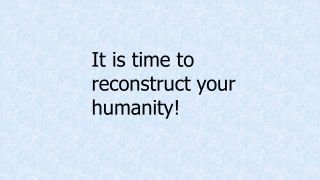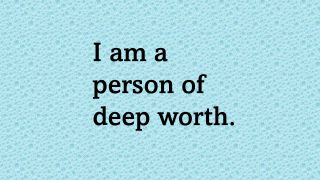Forgiveness
How Forgiving Others Helps You to Restore Your Own Humanity
A consequence of forgiving others: You improve your own worth and identity.
Posted December 22, 2022 Reviewed by Lybi Ma
Key points
- When treated unjustly by others, we can become angry, anxious, and depressed.
- Forgiving others who were unfair not only reduces negative emotions but also increases positive feelings and thoughts about the self.
- Forgiving can improve one's ability to trust others in general and improve one's identity.
Over the past 30 years, research on the psychology of forgiveness has shown that those who forgive can be healed from such psychological and physical challenges as resentment (Hebl & Enright, 1993), anxiety, and depression (Freedman & Enright, 1996; Yu et al., 2021), post-traumatic stress (Reed & Enright, 2006), and even restricted blood flow through the heart (Waltman et al., 2009).

Less well-known and discussed in the psychological literature: As you forgive others in a deep way, taking your time to understand the other's wounds, feeling compassion for the other, and being good to the one who offended, you actually can reconstruct your own humanity, becoming a stronger and better person. Consider four aspects of growing in your humanity once you have walked the pathway of forgiveness.
1. Increased positive feelings toward the self
When we are treated unjustly by others, there is a tendency to believe the lie that others are saying or implying about you in the context of the unfairness. As people denigrate you, over time you can internalize their message and begin developing negative feelings about yourself that are completely unfounded. As you reach out to the offending person with kindness, the paradox is that this kindness begins to develop toward the self. Your feelings toward yourself change from even subtly negative or from serious self-loathing to kindness toward the self in the form of enhanced self-esteem. We saw this, for example, in the study of incest survivors, who came to us not liking themselves (Freedman & Enright, 1996). As they forgave, they began to realize that they did absolutely nothing wrong. Their negative self-feelings resulted from the inner unrest with which they all had been struggling for years. They reconstructed positive feelings toward themselves.

2. Cognitive insights into one's own worth as a person
When people are the victims of deep unfairness, there is a tendency to condemn the ones who acted unfairly. The tendency is to define the other person predominantly by the unjust actions. The conclusion: That offending person is not a person of worth. Often as a subconscious thought, the victim similarly concludes this: I, too, am not a person of worth. If I were, this never would have happened to me. As people forgive, they work (and sometimes over months because this is a struggle) to see the offending person as possessing inherent (built-in) worth that cannot be earned or taken away, even by bad behavior. This is the case because each person on this earth is unique and therefore irreplaceable. This kind of thinking, offered to the offending person, then leads to a direct application of this idea to the self. If all persons are unique, irreplaceable, and therefore special, then I, also, have inherent worth. This idea can be a revelation to a person who has lived with low self-esteem for a long time.
3. Increased ability to trust in important relationships
When trust is damaged by the actions of one person, for example, a former partner, this can be so damaging that the victim generalizes the lack of trust to all persons, including potential future partners. "No one can be trusted" becomes the generalized thought. As people forgive, they realize that forgiving is a life tool to guard against excessive negative emotions that can produce courage to try a new relationship (knowing that if it does not work out, forgiveness can be a strong protection). Thus, forgiving can restore a general sense of trust, not necessarily toward an unrepentant ex-partner, allowing for a future mutually satisfying relationship with a new partner. We saw this in the study by Osterndorf et al. (2011) in which adult children of alcoholics forgave the parent who indulged in excessive alcohol consumption. The adult children, in seeing a strained relationship between mother and father, had a damaged sense of trust. Their forgiving led to a significant increase in the quality of their relationships with others.

4. A more positive identity: Who am I really?
When people are treated very badly by another person, they can fall into a new negative identity such as, "I am a victim." These words can form the basis of a generalized identity that tends to dominate the person's own thoughts. The person defines the self as a victim, one who was (and now always will be) treated unfairly. In the study by Reed and Enright (2006), when emotionally abused women forgave their ex-partner, they had a statistically significant shift in their identity from "victim" to a more positive view of their own personhood. As one person once said to me, "As I forgave, I went from seeing myself as a victim to a survivor to now a thriver." This is a major reconstruction of one's own identity.
Summary
Forgiving, I hope you see, certainly has its honored place as an empirically verified way of reducing negative psychological attributes such as anger, anxiety, and depression. The beauty of forgiving, when a person chooses to do so without pressure from others, is that it can put back the pieces of one's damaged humanity. The negative feelings of not liking oneself can transform into genuine self-liking. The hidden thought that "I am a person of inherent worth" can reemerge (or emerge for the first time) as the forgiver first offers this idea of worth to the offending person. The barrier of mistrusting others can be broken down as the forgiver sees that trust is possible and even if the next relationship does not work out, the person can forgive and protect the self. Finally, people who forgive can reconstruct their sense of who they are as persons. They can cast off the stereotype that they are only victims, but instead are people who can thrive. All of this shows a reconstruction of a humanity that was broken down, piece by piece, and now is transformed into a whole and healthy person with positive characteristics.
References
Freedman, S. R., & Enright, R. D. (1996). Forgiveness as an intervention goal with incest survivors. Journal of Consulting and Clinical Psychology, 64(5), 983-992.
Hebl, J. H., & Enright, R. D. (1993). Forgiveness as a psychotherapeutic goal with elderly females. Psychotherapy, 30, 658-667.
Osterndorf, C. L., Enright, R. D., Holter, A. C., & Klatt, J. (2011). Treating adult children of alcoholics through forgiveness therapy. Alcoholism Treatment Quarterly, 29, 274-292.
Reed, G. & Enright, R.D. (2006). The effects of forgiveness therapy on depression, anxiety, and post-traumatic stress for women after spousal emotional abuse. Journal of Consulting and Clinical Psychology, 74, 920-929.
Waltman, M.A., Russell, D.C., Coyle, C.T., Enright, R.D., Holter, A.C., & Swoboda, C. (2009). The effects of a forgiveness intervention on patients with coronary artery disease. Psychology and Health, 24, 11-27.
Yu, L., Gambaro, M., Song, J., Teslik, M., Song, M., Komoski, M.C., Wollner, B., & Enright, R.D. (2021). Forgiveness therapy in a maximum-security correctional institution: A randomized clinical trial. Clinical Psychology and Psychotherapy. https://doi.org/10.1002/cpp.2583


